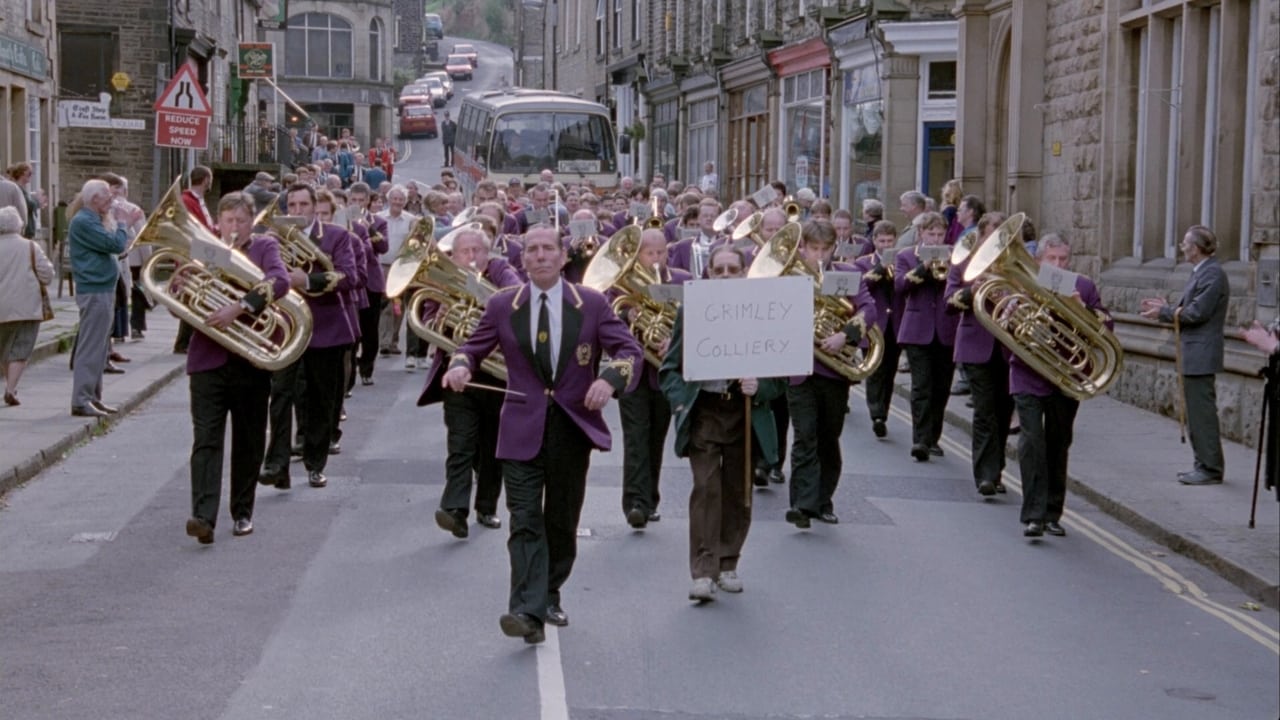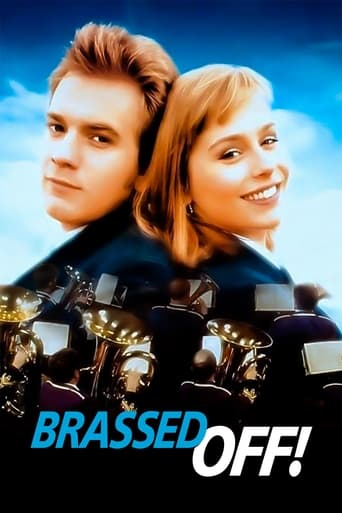Flyerplesys
Perfectly adorable
Majorthebys
Charming and brutal
Doomtomylo
a film so unique, intoxicating and bizarre that it not only demands another viewing, but is also forgivable as a satirical comedy where the jokes eventually take the back seat.
Catangro
After playing with our expectations, this turns out to be a very different sort of film.
timcon1964
This film about "Grimley" and its band is loosely based on the experiences of the miners and musicians of Grimethorpe, a small village in South Yorkshire whose economy was heavily dependent on coal mining. Characters in Brassed Off continue to feel the effects of the 1984 strike that tried and failed to prevent the closure of 20 mines. The bitterness that arose between those who continued to strike and those who returned to work still remains. In the period reflected in this movie (1992), most miners were less militant, and were willing to accept mine closure and severance pay, rather than an assessment of the mine's potential profitability as a private venture. After the mine was closed, Grimethorpe suffered from a loss of jobs and hope. All of this is reflected in the movie.The announcement of the mine's closing came just days before the 1992 National Brass Band competition. The fate of the local band after the mine is closed is the central question posed by the film. The Grimethorpe Colliery Band (which plays all the music heard in the movie) was one of many sponsored by various British communities and industries, and one of just a small handful of these bands that have been perennial contenders for national honors. In the years since 1970, the Grimethorpe Colliery Band has won the National Championships 4 times, the ITV Granada Band of the Year title 6 times, and the UK Brass in Concert Championship 14 times. Its success was partly based on recruitment of such super stars as Alan Morrison (its top cornet player) who was deemed the best lead cornet in Brass in Concert Championships in each of the five years from 1990 to 1994. (Morrison has said that his "only regret in life" is that he left the band too early and thus did not appear in the film.) His successor, Shaun Randall (who plays the cornet solo on the William Tell Overture in the movie) was named best lead cornet in the 1995 Brass Concert Championships. Although the Grimethorpe mine was closed, the Grimethorpe Colliery band has carried on. In November 2017, one organization ranked it the 10th best brass band in the world.Apart from the fate of the band, Brassed Off focuses on the personal situations of a few main characters. Incredibly, the publisher described the movie as a "delightfully entertaining comedy." This is emphatically not a comedy—unless you are inclined to chuckle at families being evicted from their homes, victims of black lung collapsing in the street, or an angry man cursing God in a church. The film stresses the tension between Danny, the band leader who considers music more important than anything, and his trombonist son Phil, who seems likely to lose everything with the closure of the mine. There is also the ambiguous romance between Gloria, who has returned to town in a mysterious role, and her old admirer Andy. Pete Postlewaite (Danny) and Stephen Tompkinson (Phil) are especially convincing. Tompkinson's role is perhaps the most challenging in the movie. Tara Fitzgerald and Ewan McGregor effectively portray the on-again, off-again, relationship between Gloria and Andy. (Viewers may recognize "Harry" as Jim Carter who played the butler "Carson" in Downton Abbey.) Although 80 per cent of the miners voted to accept closure of the mine and take severance pay, Brassed Off might lead viewers to sympathize with those who wanted to keep the mine open. But, work in the mines was not an unmixed blessing—like Danny, many miners suffered from various respiratory diseases. The movie blames mine closures on Margaret Thatcher and the Tories. Actually, the reduction in British coal production had been continuous since the 1910s, and cannot be attributed to particular leaders or political parties. The decline of British manufacturing, the development of new home heating technologies, and the switch to cheaper imported coal and to cleaner and renewable forms of energy were contributing factors. But, in a broader perspective, the film relates, not just to miners, but to the plight of all workers who are being rendered "redundant" by modern technology.
DesbUK
BRASSED OFF is a 1996 movie from England - written and directed by Mark Herman - in that tradition of those movies about the working classes attempting to better themselves: THE FULLY MONTY, BILLY ELLIOT and MADE IN DAGENHAM being other prominent examples. At the time it seemed like one of the last nails in the coffin of the outgoing Tory government.It's set in a real-looking Yorkshire mining town a few years after the 1984/85 miners strike, where the local coal mine is about to be closed. The miners (Ewan McGregor, Jim Carter, Stephen Tompkinson and others) find solidarity in their brass band under their conductor - retired miner Danny (the late Pete Postlewaite in his finest screen role), a man for whom music matters above all else. The pit closes, but the band makes it to the national brass band competition final at the Albert Hall. On winning, you expect Danny to make some sentimental speech about how - in spite of everything - music holds the band together. Instead, he delivers probably the explicit political diatribe against the then Conservative government and the devastation unemployment inflicts on people. It's a superb moment in a film with its heart and soul in the dying working class communities of Yorkshire. This isn't a piece of Ken Loach-like realism - it's prettified and sentimentalised for a mainstream audience, yet the movie looses nothing for it.At the close, the brass band play Elgar's Pomp and Circumstace March Number 1 as they pass the Houses of Parliament. It's meant to be ironic but it's also very touching.
johnm-skews
I was born into a pit village (Wombwell) and i lived / worked through the miners strike. Not as a miner, but believe me when i say that everyone - EVERYONE who lived in the area at the time was effected in one way or another. The film depicts the relationships that existed at and around the time of the strike and the years that followed. It was a time of turmoil and Brassed Off is spot on in it's depiction of how friends and neighbours / colleagues and workmates / staff employed underground and in management or office roles were at loggerheads.Nothing can ever truly express the feelings and hardship that was the miners strike and the pit closures that followed.Arthur Scargill (figure of hate / love / comedic derision or political leader dependent on your background) was WRONG.Not necessarily in his views but certainly in his prophecy of the future. For even he did not predict the final number of pits that the Thatcherite government would evidentially close.The film is to many a landmark in British movie standards. To pigeon hole this film as a comedy - musical - political dialogue - does not do the film justice.If ever a film ticked all the boxes, this is the one.So sit back and watch a true cinematic epic! And the music (from a heavy metal fan at heart) is fantastic beyond all proportions.If you don't feel overwhelmed by William Tell or if Danny Boy doesn't bring a tear to your eye - then you may as well give up, as the message and the meaning of this film (that the only really important things in life are what you have always taken for granted) are probably why you never understood films such as Kes.
raebari
Having rented a piece of c--p titled "Little Miss Sunshine" last week,I have given up on paying for what Hollywood deems quality filming. So I was surfing the movie channels, came across "Brassed Off," and what hooked this former USA marching band member was the gloriously rich music that accompanied the film's action. Everything politically important has been said on the previous 12 pages of this IMDb commentary, particularly about Thatcher, Reagan (and now Bush) and that ilk, who put profit above all and people last. This film, yes, does belong in the "full monty" category, but even more, it falls into the "Drum Line" category as well--the power that music has to lift people above their ordinary lives and to help them realize the depth of their humanity. This film, like "Drum Line," is an education in itself about musical traditions that millions are ignorant of. I was stunned at the richness of sound produced by a colliery band--no woodwinds to thin out the total effect.The film also has echoes of "How Green Was My Valley," a film made in the 40's and set in Welsh coal-mining country, where male choral groups meet weekly and also compete in an annual national contest.In addition, as an American tourist in Yorkshire, I loved the literary aspect of that area--Bronte country, if you will--being an English teacher, but this film was a cold slap in the face concerning the reality of the fate of men and women upon whose backs and blood the nation was enriched, and who are discarded, like rusty tools, when "conservative" economics trumpet the importance of "investors" over the fate of the workers in the industry. Yes, as one commentator pointed out, coal has no future in the 21st century, but short-sightedness and greed have ignored the need for other energy solutions that could have saved those Yorkshire communities and families, and which just might make the planet inhabitable for our grandchildren--if we don't continue to be stupid.

